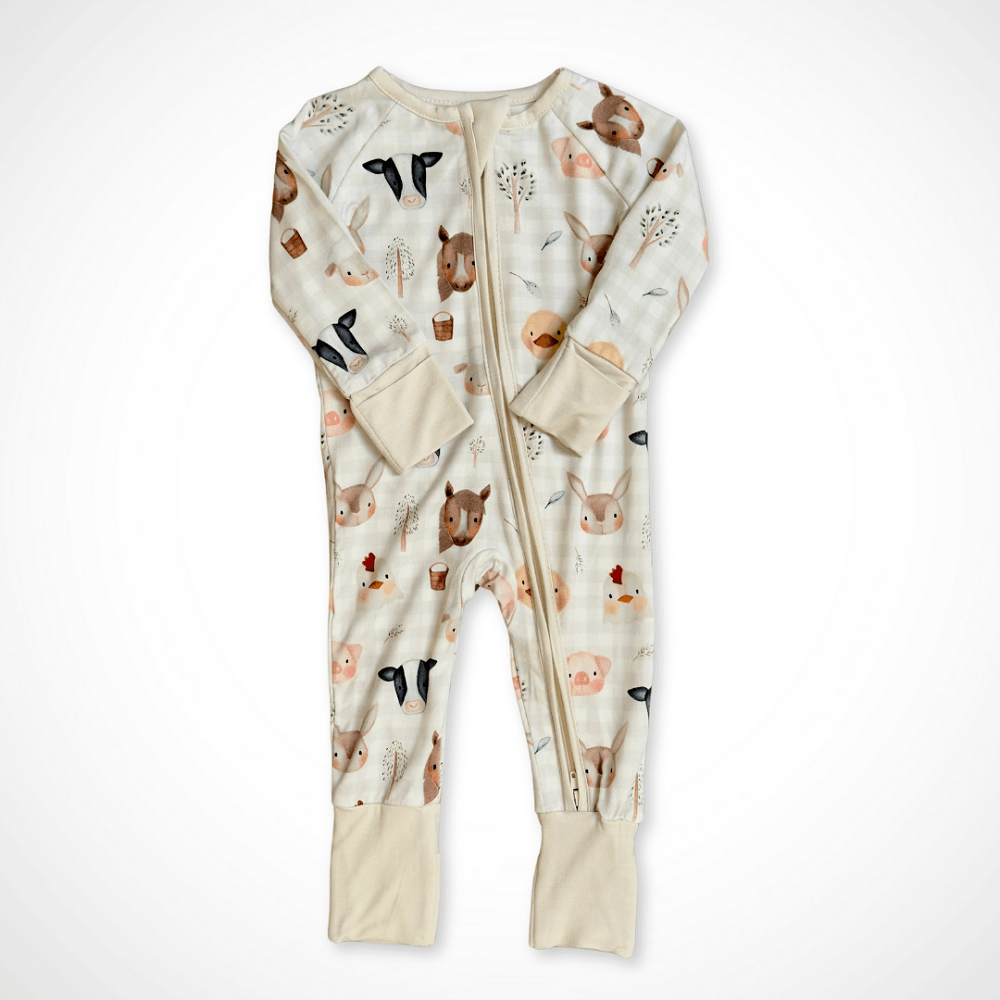What is Sustainable Sleepwear?
Sustainable sleepwear is designed with eco-friendly materials and ethical manufacturing practices. It aims to reduce environmental impact and support sustainable fashion. These clothes focus on comfort, durability, and responsible resource usage. They are crafted to meet consumer needs with minimal harm to the planet.
Key Features of Sustainable Sleepwear
- Eco-friendly Materials: Often made with organic cotton, bamboo, or recycled fabrics.
- Ethical Production: Manufacturing processes respect workers’ rights and ensure fair wages.
- Non-toxic Dyes: Natural or low-impact dyes avoid harmful chemicals, protecting skin and the environment.
- Comfort and Durability: Sustainable fabrics are soft, breathable, and built to last.
- Certifications: Recognized labels like GOTS or OEKO-TEX ensure reliability and eco-standards.
Differences Between Sustainable and Conventional Sleepwear
- Material Sources: Conventional sleepwear often uses synthetic fabrics like polyester. Sustainable options focus on organic and renewable materials.
- Impact on Environment: Conventional sleepwear contributes to pollution and waste. Sustainable sleepwear minimizes carbon footprint and water usage.
- Chemicals Used: Regular manufacturing involves toxic dyes and treatments. Sustainable processes avoid harmful substances.
- Durability: Sustainable sleepwear typically lasts longer, reducing the need for frequent replacements.
- Focus on Ethics: Conventional production may rely on exploitative labor practices. Sustainable options prioritize ethical labor and fair trade.

Materials Used in Sleepwear
Sustainable sleepwear relies on eco-conscious materials for comfort and environmental responsibility. These fabrics reduce harm to nature while ensuring softness and durability. Let’s explore the common materials used in crafting this type of sleepwear.
Organic Cotton and Bamboo
Organic cotton is grown without harmful pesticides or fertilizers. It reduces water waste and ensures skin safety. This fabric is soft, breathable, and perfect for sensitive skin. Bamboo, another sustainable option, is fast-growing and requires less water. It naturally resists bacteria, making it ideal for nightwear. Bamboo fabric is lightweight, moisture-wicking, and maintains temperature control.
Recycled Fabrics and Their Benefits
Recycled fabrics like polyester are made from pre-used materials, including plastic bottles. They reduce landfill waste and raw material consumption. These fabrics are durable, easy to care for, and less taxing on the planet. Choosing recycled fabrics supports circular fashion, lowering the demand for virgin resources while providing high-quality sleepwear options.
Benefits of Choosing Sleepwear
Sustainable sleepwear offers a range of advantages that extend beyond just clothing. It provides environmental benefits, promotes comfort, and increases durability, making it a responsible choice for consumers.
Environmental Impact Reduction
Sustainable sleepwear reduces harm to the planet through eco-friendly practices. The use of organic and renewable materials decreases water waste and lowers carbon emissions. Manufacturing processes avoid toxic chemicals, protecting ecosystems from pollution. By choosing sustainable options, consumers support waste reduction and circular fashion.
Comfort and Skin-Friendly Fabrics
Eco-friendly fabrics like organic cotton and bamboo are soft and breathable. These materials minimize irritation, ideal for sensitive skin. Bamboo’s antibacterial properties ensure freshness and comfort all night. Natural dyes used in sustainable products protect skin by avoiding harmful chemicals.
Longevity and Durability
Sustainable sleepwear is built to last, reducing frequent replacements. Durable fabrics resist wear and tear over time. High-quality stitching ensures long-term use, preventing waste. Choosing long-lasting sleepwear reduces consumption and contributes to a less wasteful lifestyle.

Popular Brands Offering Sleepwear
Sustainable sleepwear has gained popularity as more brands embrace eco-friendly practices. These brands cater to various needs and budgets, offering ethical and stylish options. Let’s explore some great choices for sustainable sleepwear.
Affordable Sustainable Options
Affordable brands make sustainable sleepwear accessible to everyone. They focus on eco-friendly materials and ethical practices while keeping prices reasonable.
- PACT: PACT offers organic cotton sleepwear made using ethical labor practices. Their products are soft, breathable, and affordable.
- Boody: Boody specializes in bamboo-based sleepwear, known for its comfort and moisture-wicking abilities. Their pricing is wallet-friendly.
- Thought: Thought uses natural fabrics like hemp and recycled fibers for stylish, sustainable sleepwear. Their garments are both eco-conscious and affordable.
- People Tree: People Tree creates GOTS-certified organic cotton sleepwear with a focus on fair trade and affordability.
These brands show that sustainable comfort doesn’t have to break the bank. They make it easier for consumers to choose environmentally responsible nightwear.
Luxury Sustainable Sleepwear Brands
Luxury brands combine elegance with sustainability, using premium materials and impeccable craftsmanship. These options are perfect for those who prioritize comfort and luxury.
- SILKED: SILKED offers premium silk sleepwear made using eco-friendly processes. Their designs are timeless and luxurious.
- Amour Vert: Amour Vert crafts sleepwear with ethically-sourced fabrics, focusing on style and sustainability. Their pieces exude luxury.
- Eberjey: Known for its soft, sustainable fabrics, Eberjey creates chic sleepwear ideal for upscale comfort.
- Coyuchi: Coyuchi offers luxurious pajama sets using organic and natural fibers. Their products are responsibly made and highly durable.
Luxury sustainable sleepwear showcases high-quality eco-conscious design, proving that elegance and ethics can coexist.
Whether you prefer affordable or luxury options, these brands make sustainable sleepwear an achievable choice.
How to Care for Your Sleepwear
Caring for your sustainable sleepwear correctly helps maintain its durability and eco-friendly features. Proper care ensures its longevity and minimizes environmental impact. Here’s how to keep your eco-conscious garments in excellent condition.
Washing Tips to Prolong Lifespan
- Wash in Cold Water: Use cold water to retain fabric integrity and reduce energy consumption.
- Use Gentle Detergents: Opt for eco-friendly, non-toxic detergents to protect the fabric and the environment. Avoid bleach.
- Hand Wash When Possible: Hand washing reduces wear and tear compared to machine washing.
- Turn Garments Inside Out: Always turn sleepwear inside out to preserve colors and protect delicate areas.
- Avoid Overwashing: Unless heavily soiled, washing sleepwear after every few uses helps preserve its quality.
Eco-Friendly Laundry Practices
- Air Dry Over Machine Drying: Air dry your sleepwear to prevent fabric shrinkage and save energy.
- Low Heat Settings: If using a dryer, choose a low heat setting to protect delicate fabrics.
- Shorten Wash Cycles: Shorter cycles use less water and electricity, making it better for the environment.
- Wash Full Loads: Combine clothes to reduce water and detergent waste per wash.
- Avoid Fabric Softeners: Fabric softeners may weaken sustainable fibers and reduce their eco-friendly qualities. Substitute with white vinegar for softness.
Taking these steps ensures your sustainable sleepwear lasts longer and stays as eco-friendly as possible. Regular, mindful care not only preserves your garments but also upholds your commitment to sustainability.

Tips on Choosing the Right Sustainable Sleepwear
Selecting the right sustainable sleepwear ensures comfort, style, and eco-friendliness. Here are some guidelines to help you make an informed choice.
Factors to Consider: Fit, Fabric, and Certifications
- Fit: Choose sleepwear that fits well without being too tight or too loose. Look for styles that provide comfort and ease of movement during sleep. Adjustable straps or elastic waistbands can add flexibility.
- Fabric: Opt for soft, breathable fabrics like organic cotton or bamboo. These materials ensure comfort and reduce irritation for sensitive skin. For colder climates, consider thicker options like hemp blends for warmth.
- Certifications: Look for certifications that guarantee eco-friendly and ethical practices. Verified certifications ensure the authenticity of sustainable claims, giving you peace of mind with your purchase.
Certifications to Look For in Sustainable Products
- GOTS (Global Organic Textile Standard): Ensures organic material use and responsible manufacturing practices.
- OEKO-TEX: Verifies that the fabric is free from harmful chemicals and safe for skin.
- Fair Trade Certified: Guarantees ethical labor practices and fair wages for workers.
- FSC (Forest Stewardship Council): Validates sustainable sourcing of wood-based materials like bamboo.
By considering these factors and certifications, you can find sustainable sleepwear that aligns with your values and lifestyle.
Why Sleepwear Matters for a Better Future
Sustainable sleepwear is a crucial step toward a more eco-conscious and ethical future. By choosing these environmentally friendly options, consumers play an essential role in shaping a responsible fashion industry. It’s not only about personal comfort but also about making better choices for the planet.
Supporting Ethical Practices in the Fashion Industry
Sustainable sleepwear ensures ethical practices are upheld during production. Brands that prioritize sustainability often ensure fair wages and safe working conditions for their workers. These ethical labor practices reduce the exploitation of garment workers around the globe.
Additionally, sustainable brands actively avoid exploitative child labor practices and support communities through fair trade initiatives. Purchasing sustainable sleepwear directly encourages businesses to adopt higher ethical standards. It pushes the fashion industry toward a balance of profit, people, and planet.
Supporting ethical brands not only makes an impact now but also leaves a better legacy for future generations. The more consumers choose sustainably, the clearer the demand becomes for global industrial change.
Reducing Carbon Footprint Through Better Choices
Sustainable sleepwear plays an important role in minimizing the fashion industry’s carbon footprint. By choosing options made with organic cotton, bamboo, or recycled materials, consumers reduce dependency on resource-heavy synthetic fabrics.
The production of sustainable sleepwear often uses less water and fewer chemicals. This helps protect ecosystems and reduces pollution. For example, organic cotton and bamboo fabrics require significantly less water than conventional cotton farming.
In addition, sustainable brands often focus on minimizing waste. By reusing materials or recycling fabrics, these brands prevent clothing from piling up in landfills. Choosing long-lasting sleepwear also reduces over-consumption. With less production needed, fewer carbon emissions enter the atmosphere.
Each purchase of sustainable sleepwear makes a difference. It signals to the fashion industry that green practices are not just welcome but essential for a better future.

Exploring Sustainable Sleepwear Styles
Diverse Styles for Everyone
Sustainable sleepwear comes in a variety of styles to suit everyone’s preferences. Whether you prefer traditional pajama sets, cozy nightdresses, or relaxed loungewear, there are options available that prioritize sustainability. Many brands now design their sleepwear with fashionable elements, making it easy to look chic while feeling comfortable.
For instance, pajama sets can range from classic button-up styles with soft fabric to modern, minimalist designs with clean lines. There are also options like sleep shorts and tank tops for warmer weather. Nightgowns have evolved, incorporating beautiful details such as lace trims or printed patterns while still being made from eco-friendly materials. With so many choices, individuals can find styles that resonate with their personal aesthetic while supporting sustainable practices.
Seasonal Considerations
When selecting sustainable sleepwear, it is essential to consider seasonal changes. The fabric weight and style may vary depending on the time of year. For colder months, you might prefer long-sleeve pajama sets or flannel sleepwear designed to keep you warm and cozy. In contrast, lightweight cotton or bamboo styles are ideal for the warmer months, providing breathability and keeping you cool as you sleep.
Additionally, layering can be an effective strategy for transitioning between seasons. Lightweight ratty robes or wraps made from organic materials can be an excellent addition to any sleepwear collection, allowing for comfort and warmth when needed. By adapting your sleepwear choices to the season, you can maintain comfort and quality while also practicing sustainability.
The Role of Consumer Awareness
Educating Yourself and Others
Consumer awareness plays a pivotal role in the rise of sustainable sleepwear. As individuals take the time to research and understand the implications of their purchases, they can make informed decisions that align with their values. Educating yourself about the brands’ practices, materials used, and the transparency of their supply chains is essential for promoting sustainable choices.
Sharing information about sustainable sleepwear with friends and family can help cultivate a community focused on eco-friendly lifestyles. Engaging in conversations about the impact of fast fashion and the importance of supporting sustainable practices can inspire others to make conscious decisions. This collective awareness can drive demand for sustainable options in various markets, gradually shifting the fashion industry toward responsibility.
Supporting Sustainable Initiatives
Another vital aspect of understanding sustainable sleepwear is supporting initiatives that foster ethical practices in the fashion industry. Many organizations aim to improve labor conditions, promote sustainable materials, and reduce environmental impact. By purchasing from brands that align with these initiatives, consumers can contribute to the growth of a more responsible marketplace.
Engaging with local eco-friendly events or workshops focused on sustainability can also deepen your understanding and commitment to sustainable practices. Additionally, consider advocating for policies that encourage transparency and ethical production at both local and national levels. By taking an active stance, you can play a part in making sustainable sleepwear the norm rather than the exception.

The Future of Sustainable Sleepwear
Innovations in Fabrics and Designs
As sustainability continues to gain traction, the future of sleepwear looks promising. Innovations in fabric technology and production methods are on the rise. Brands are researching biodegradable materials, recycled fabrics, and even plant-based dyes that minimize environmental harm. This progress indicates a growing market for sustainable products, pushing forward eco-friendly solutions.
Designers are also experimenting with upcycled materials and circular business models, where products are designed for longevity, repairability, and recyclability. These practices reduce waste and signify a monumental shift towards responsible consumption. As more brands adopt these innovative practices, consumers can enjoy increasingly diverse options that prioritize sustainability.
Building a Sustainable Lifestyle
Integrating sustainable sleepwear into your life is just one step in embracing an overall sustainable lifestyle. As consumers become more aware of their choices, they often find themselves seeking eco-friendly options in other aspects of their lives. From home goods to personal care products, the desire to minimize environmental impact often expands beyond clothing.
By consciously choosing sustainable sleepwear, one can begin a journey towards a more sustainable lifestyle. The knowledge and practices acquired through this journey can lead to more significant changes in habits, ultimately leading to a more positive relationship with the planet. In this way, sustainable sleepwear symbolizes not only a commitment to personal comfort but also a broader dedication to environmental responsibility.
In conclusion, embracing sustainable sleepwear is an excellent way to support eco-friendly practices while ensuring comfort during sleep. With a variety of options, materials, and styles to choose from, individuals can tailor their choices to fit personal preferences and seasonal needs. By prioritizing sustainability in sleepwear, consumers contribute to a growing movement that impacts not only their lives but also the environment at large. Through education, awareness, and innovative practices, the future of sleepwear holds great promise for a more sustainable world.
